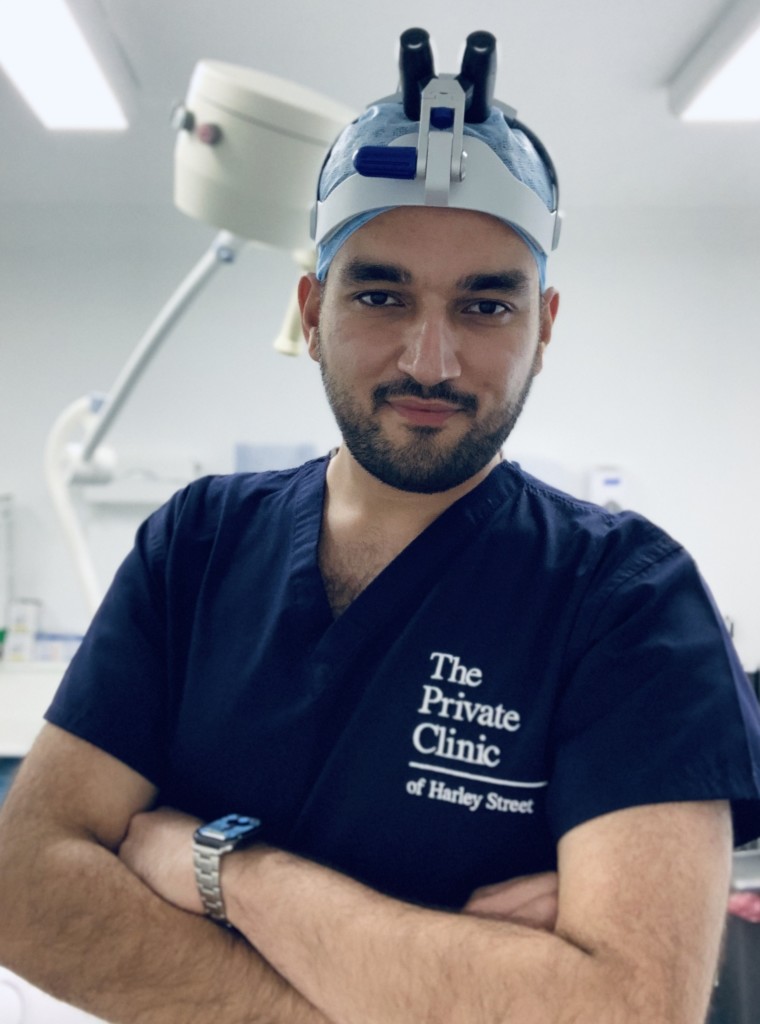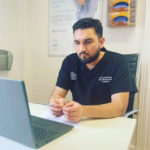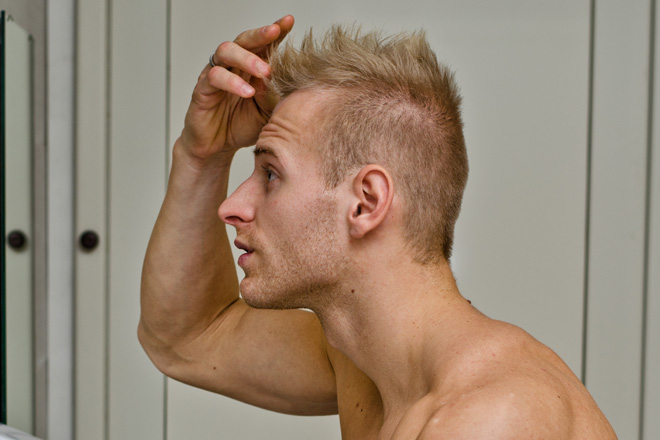It’s no secret that hair loss is a huge issue for men, indeed there are believed to be over 6.5 million male hair loss sufferers in the UK alone. It’s so commonplace that entire industries are devoted to helping men deal with it. But hair loss can be a complex topic to talk about and many men still feel embarrassed or self-conscious about it, consequently, it remains very much of a taboo subject.
Sadly this taboo prevents so many people from speaking out about the issue and stops them from seeking assistance.
I am working hard to break taboos around this and to make people aware of the huge positive impact hair restoration can have for men of varying ages. The physical and psychological impact of this type of surgery should not be underestimated.

What causes hair loss?
There are a number of factors that can cause hair loss. Typically we lose between 50-100 hairs a day however there are a number of things that can cause someone to lose more hair than this including; genetics, hormone changes, medication, age and certain medical conditions. Lifestyle factors such as poor nutrition, stress and/or alcohol consumption can also be factors.
There has also been a surge in hair loss concerns since the pandemic.
I’ve certainly seen an increase in people enquiring about hair restoration treatment as a result of post-covid hair loss. Even if your hair loss isn’t a result of Covid, research suggests a hair loss rate of 40% for men beginning at age 35 and growing to a 70% loss rate aged 80. The majority of the population will warrant professional services to help them restore their hair at some point.
The fact that the issue of hair loss is so far-reaching emphasises the importance of breaking the taboos around it so that men don’t feel ashamed to not only discuss it, but also to seek support and treatment.
Fortunately, there are a number of things that can be done to reduce hair loss and encourage a healthy head of hair.
1. Reduce your alcohol intake
Whilst alcohol itself hasn’t been directly linked to hair loss it can lead to dehydration which can also dry out hair follicles. Over prolonged periods of time this can also raise the acid levels in your body and affect protein absorption.
Together this can have a negative impact on the hair follicles and hair health resulting in hair thinning and loss. Reducing alcohol intake can help to support healthy hair growth. If you drink alcohol ensure you avoid dehydration by interspersing alcoholic drinks with plenty of water.
2. Learn to spot a non-typical cause
An autoimmune condition such as alopecia areata stops the body from recognising its own hair follicles and attacks them. Sometimes people with alopecia areata do see their hair grow back. In this particular condition hair usually falls in “clumps” and may respond well to treatment. Other medical conditions such as thyroid disorders also result in hair loss but this can cause a type of loss that causes all of the hair on the scalp to thin. Typical male and female pattern baldness follow a recognisable “pattern” of loss and this may help differentiate from an obvious underlying cause. We always look to treat any underlying conditions, where resistant we may be able to achieve good results with non-surgical treatment such as PRP or platelet-rich plasma injections or ultimately hair restoration surgery.
3. Take the right vitamin supplements
Health and nutrition is an important factor in healthy hair growth. Many of us are lacking in essential vitamins and minerals because we don’t get enough of them in our diet and so vitamin supplements can be a good way of ensuring you’re getting the necessary micronutrients that are essential for hair growth.
Vitamin and/or mineral deficiencies are often unnoticed and can have a gradually worsening impact on hair loss. Vitamin A helps skin glands make an oily substance called sebum. Sebum moisturises the scalp and helps keep hair healthy. Similarly, Vitamin D, which is commonly deficient, is linked to sunshine exposure. Research shows that a lack of vitamin D in your body can lead to hair loss. When there isn’t enough vitamin D in your system, such as during the winter months or when people are unable to seek sunshine abroad, hair growth may be stunted. A good supplement will contain a balance of essential vitamins and minerals required for healthy hair.
4. Look at what you’re eating
To ensure there’s enough Biotin within your diet try to include sweet potatoes, carrots, pumpkins, spinach and kale into your diet as they are all high in beta-carotene which is turned into vitamin A. You can get B-vitamins from many foods, including whole grains, almonds, meat, fish, seafood and dark, leafy greens. For vitamin D consume fish, seafood and egg yolks.
5. Consider PRP for the scalp
PRP or Platelet-Rich Plasma therapy works by taking a small amount of blood and separating it in a centrifuge.
The platelet rich plasma contains stem cells and growth factors which are separated from your blood and injected into the scalp. The growth factors then stimulate the activity of the hair follicles and promote hair growth.
It takes a matter of minutes to take blood and then around 10 minutes to spin it in the centrifuge to separate it. Afterwards, there’s no significant downtime or scarring and from six weeks most of my patients will start to notice a response, usually describing thicker and better quality hair.
6. Try to reduce stress
Stress can have a significant impact on a patient’s overall health and in turn a person’s hair. Stress raises androgen levels which can be linked to hair loss. Stress can also give rise to a number of other issues such as scalp problems (i.e. dandruff) and change in eating habits which in turn can impact the hair.
Try to eat a balanced diet and eat regularly. Foods that release their energy slowly like complex carbohydrates help avoid sudden crashes. Eating a diet rich in green leafy vegetables, wholegrains, legumes, nuts and seeds will help you achieve daily levels of the B Vitamins, Zinc and Magnesium that have been shown to help control anxiety and stress. Exercise and meditation as well as adequate sleep is vital to reducing stress. See a doctor if you’re finding it difficult to cope.
7. Invest in hair restoration
Hair restoration surgery can be an extremely effective option for people experiencing hair thinning and bald patches. It involves minimal discomfort, once the local anaesthetic has been administered it is generally pain-free. The procedure that I perform at The Private Clinic is usually performed in one day and you are able to go home straight after. The average age of the patient that I see for a hair transplant is 35.5 years and 98% of my patients report that their hair transplant surgery has significantly improved their confidence and self-esteem.
About the expert
 Specialist Hair Transplant Surgeon, Dr Furqan Raja is one of the leading Hair Transplant Surgeons in the UK. Working from the esteemed The Private Clinic in London’s Harley street as well as clinics in Manchester and Leeds, Dr Raja devotes his practice to offering the highest standards in hair restoration surgery. A highly respected hair and scalp expert, his artistry and attention to detail are second to none and he is noted for his special interest in advanced FUE techniques, FUT surgery, correction and restorative surgery. Renowned for providing discreet and minimally visible procedures he has a strong portfolio of celebrity clients.
Specialist Hair Transplant Surgeon, Dr Furqan Raja is one of the leading Hair Transplant Surgeons in the UK. Working from the esteemed The Private Clinic in London’s Harley street as well as clinics in Manchester and Leeds, Dr Raja devotes his practice to offering the highest standards in hair restoration surgery. A highly respected hair and scalp expert, his artistry and attention to detail are second to none and he is noted for his special interest in advanced FUE techniques, FUT surgery, correction and restorative surgery. Renowned for providing discreet and minimally visible procedures he has a strong portfolio of celebrity clients.

